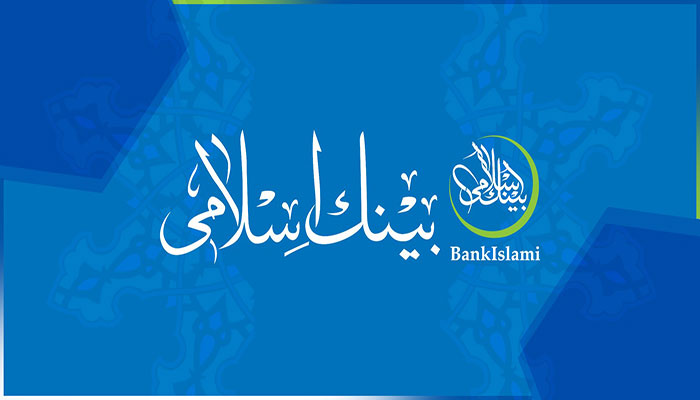‘BankIslami aims to expand financing footprint in agri, SME sectors’
KARACHI: BankIslami is deeply invested in increasing its outreach to agriculture and small and medium enterprises (SME) because of a huge demand of Shariah-compliant financing in these two key sectors of Pakistan’s economy.
These views were expressed by Syed Amir Ali, CEO BankIslami, in an exclusive interview with The News.
Q: How do you see the Islamic banking opportunities across agriculture and SME sectors in Pakistan?
A: Assets of Islamic banking industry increased Rs76 billion during the January-March, 2020, quarter and were recorded at Rs3,360 billion, compared to Rs3,284 billion in the previous quarter. Out of the total asset portfolio, the share of overall finance to the SME sector was reported at around 3 percent. This clearly reflects a huge opportunity for increase in the share of SME considering the National Financial Inclusion Strategy (NFIS) vision of the SBP (State Bank of Pakistan) and the size of the overall SME contribution to the GDP of the country.
In line with the NFIS and strategic direction of the SBP, key benchmarks to be achieved in 2020 are to increase SME share from existing 8 percent of private sector credit to 17 percent and to increase the number of borrowers from existing 174,000 to 500,000.
As per the strategy for Islamic banking, there are some targets set till the year 2023 such as accomplishment of 25 percent share in total assets and deposits of the banking industry and accomplishment of 30 percent share in the total branch network of the industry.
There is a need to develop and introduce dedicated concessionary refinance models under Islamic banking products, providing the necessary impetus to the overall SME population only interested in availing financing under Islamic modes of finance at affordable rates.
BankIslami is playing its role in promoting SME finance. The bank is offering a letter of credit initiative programme. This is a fast track model for accommodating import based requirements with specific focus on SMEs. The bank is also offering structured Shariah-compliant products under Islamic Finance in line with SBP refinance schemes for SMEs. Moreover, our value chain financing and fleet financing models are in progress.
The market need for the Islamic products is very high by the farmers as the rural population is a bit sensitive in religious matters and prefers to opt for Islamic banking products. However, due to lack of understanding, awareness, and concepts of Shariah-compliant modes of financing, farmers continue to avail financing from commercial banks.
It has been witnessed that commercial banks generally offer revolving credit facilities to customers, however; Islamic banking Institutions (IBIs) are offering a range of Shariah-compliant products to customers in accordance with their business model, requirements and payment capacity which gives an edge to IBIs. Furthermore, IBIs typically offer Murabahah, Salam & Diminishing Musharakah products to large and medium-sized farmers whereas 90 percent of the farmers fall under small categories (Punjab and KPK up to 12.5 acres, Sindh 16 acres, and Balochistan 32 acres).
Development of a wide range of customised products are needed to cater the financing requirements of all types of farmers (small, medium, and large), which will assist IBIs in penetrating, and expanding new and existing markets respectively.
A huge market is open and available for IBIs to penetrate by offering wide range of agri-financing products to meet the financing requirements of farmers pertaining to farm sector (cropping & farming machinery, godowns, etc) and non-farm (dairy farming, cattle farming, poultry farming, fisheries, etc).
We are proud to mention that at the moment, BankIslami has become the fastest growing bank in agriculture financing. Furthermore, BankIslami is the only bank in Pakistan offering warehouse receipt financing to farmers and traders on paddy and maize crops with approval time of 1 hour and disbursement time of 24 hours. This is the start and with a focused strategy and dedicated team, we intend to increase the outreach to this sector which will no doubt result in a prospering green economy.
Q: What are your bank’s key strategic goals for the coming years?
A: As far as strategic goals are concerned, the bank has specifically focused on increasing its CASA (i.e. current and saving account) deposits in its three years strategic plan through different promotional campaigns. The bank has also decided to escalate its quality assets’ portfolio where customers with a good track record will exclusively be preferred for the bank's offerings. The bank having a large corporate and consumer (i.e, auto, housing etc.) portfolio has projected to reduce its non-performing loans ratio through different strategies. Moreover, the bank has planned to increase its trade business in coming years by approaching and inducting NTBs (new to bank customers). BankIslami has further planned to increase customers’ reach through different marketing and promotional campaigns.
Q: What is your bank’s role in the SBP’s Rozgar scheme and loan repayment deferment?
A: BankIslami joined hands with the SBP in combating the impact on the economy post COVID-19 by providing concessionary schemes introduced by the central bank through its channel to the existing as well as prospective customers with a special focus on the SME sector being the backbone of the economy, contributing around 30 percent to the GDP of Pakistan.
BankIslami has accommodated around over 30 business entities encompassing around 18,000 plus employees under the salary support program belonging to the various companies/firms falling under the corporate/commercial and SME categories with approved funding support accumulating to around Rs1.7 billion plus.
Further, BankIslami has supported 82 customers out of its existing customer’s base in deferment of principal financial obligations to the tune of Rs10.5 billion, while financial obligations to the tune of Rs5.2 billion have been rescheduled or restructured for 18 customers under the SBP directives.
Q: What is your strategy regarding participating in the Mera Pakistan Mera Ghar Scheme?
A: BankIslami has been in the housing finance business for the last 13 years and has gradually grown into a prominent player in the industry and has outperformed many other banks that are much larger in terms of size and infrastructure. BankIslami is dedicated to providing house finance to all demographic categories and has an enthusiastic house financing team in place to handle all new initiatives.
In order to facilitate individuals acquiring house ownership, the government along with the SBP has been pursuing banks to contribute more towards house financing, which will ultimately facilitate individuals towards acquiring house ownership. In line with the announcement made by the Prime Minister and under the guidelines of the SBP, BankIslami has also made a distinct policy for 5 and 10 Marla low and middle income housing scheme. We have made sure that our policy covers the projects of Naya Pakistan Housing Programme and it will also be applicable on private projects and single house/unit titles of 5 and 10 Marlas.
Q: Do you think your bank will be able to meet its earnings target and asset quality in the rest of the year given the economic slowdown as well as novel coronavirus pandemic?
A: The COVID-19 pandemic resulted in economic uncertainty at a global level, and the situation was not different for Pakistan. This was largely due to reduced trade, financial, retail, and industrial activities on account of imposition of lock-downs at universal level. The SBP, to counter the ensuing financial impact on the leveraged segments, took various measures including reduction of policy rate by 625 basis points from 13.25 percent to 7 percent and introduction of relief packages for deferment of financing payments for banking customers.
The deferment-related relief introduced by the SBP provided the bank with an opportunity to prevent its asset portfolio from deterioration; the rapid cut in policy rate would lead to shrinkage in the top line (net spreads) of the bank, particularly during the latter half of the FY2020 due to gradual re-pricing of bank’s asset portfolio. To compensate for the effect of this decline, BankIslami took several initiatives such as deferral in its branch expansion plans for a short-run, working to efficiently reduce its administrative expenses, and working on re-profiling of its deposits’ base with a greater focus towards capturing low cost CASA deposits.
-
 ASAP Rocky Recalls 'embarrassing' First Meeting With Rihanna
ASAP Rocky Recalls 'embarrassing' First Meeting With Rihanna -
 Archie, Lilibet’s Chances At Meeting King Charles Get Promising Update: Here’s Why
Archie, Lilibet’s Chances At Meeting King Charles Get Promising Update: Here’s Why -
 Claire Foy Shares Rare Views On Typecasting Amid New Gig
Claire Foy Shares Rare Views On Typecasting Amid New Gig -
 Britney Spears Raves About Madonna In New Social Media Post
Britney Spears Raves About Madonna In New Social Media Post -
 Hailey Bieber Shares Sweet Snap Of Husband And Baby
Hailey Bieber Shares Sweet Snap Of Husband And Baby -
 Therapist Killed In Office As Former Client Launches Knife Attack
Therapist Killed In Office As Former Client Launches Knife Attack -
 Gaten Matarazzo Brands 'Stranger Things' Final Scene 'nerve-racking'
Gaten Matarazzo Brands 'Stranger Things' Final Scene 'nerve-racking' -
 David Beckham Speaks Out After Son Brooklyn Beckham's Shocking Post
David Beckham Speaks Out After Son Brooklyn Beckham's Shocking Post -
 Sophie Turner Gets Candid About 'imposter Sydrome' Post 'GOT'
Sophie Turner Gets Candid About 'imposter Sydrome' Post 'GOT' -
 When Nicola Peltz's Boyfriend Anwar Hadid Found Solace In Dua Lipa's Arms
When Nicola Peltz's Boyfriend Anwar Hadid Found Solace In Dua Lipa's Arms -
 Claire Foy Reveals Rare Impact Of 'The Crown' Gig On Career
Claire Foy Reveals Rare Impact Of 'The Crown' Gig On Career -
 Megan Thee Stallion Teases New Music On The Way
Megan Thee Stallion Teases New Music On The Way -
 Blonde Kate Stuns In Photos With Prince William During Rare Joint Engagement
Blonde Kate Stuns In Photos With Prince William During Rare Joint Engagement -
 Kate Gosselin Reveals Harrowing Moment Thief Nearly Took Her Down
Kate Gosselin Reveals Harrowing Moment Thief Nearly Took Her Down -
 Billy Bob Thornton Weighs In On Contrast To 'Landman' Role
Billy Bob Thornton Weighs In On Contrast To 'Landman' Role -
 Amanda Holden May Swap Position To Different Reality Show: See Which
Amanda Holden May Swap Position To Different Reality Show: See Which




